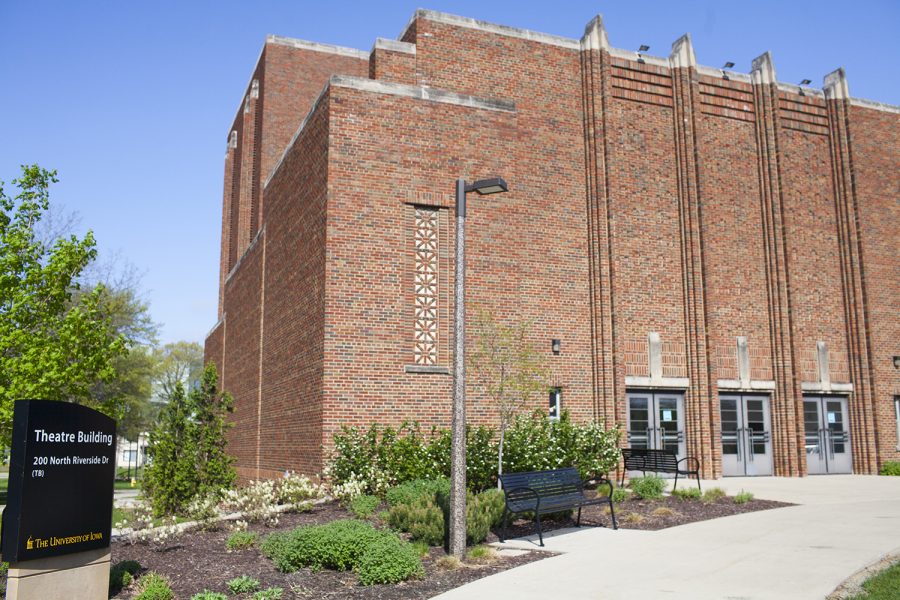Generation Candyland: UI Theatre Department’s next play tackles some not-so-sweet subject matter
Generation Candyland: A Fable explores the dark side of challenges faced by teenagers and young adults in the 21st century.
The University of Iowa Theater Building as seen on Monday, May 6, 2019.
February 11, 2021
Trigger Warning: This article includes mentions of substance abuse and trauma.
The name “Candyland” may bring to mind children happily playing a brightly colored family-friendly board game. The University of Iowa’s next gallery show, however, is much darker.
Generation Candyland: A Fable explores the thoughts and concerns of playwright Emma Silverman’s high school self. Silverman, a graduate student at the UI, told The Daily Iowan she wanted to dive into the complexities of growing up in the 21st century.
“The play is about adolescence in a lot of ways, and what it’s like to be a young person right now, figuring out who you are against a backdrop of everything that’s going on in the world,” Silverman said.
She said that growing up at a time when news cycles require media organizations to report on tragedy after tragedy has an effect on the way she — and the rest of her generation — views the world and their place in it.
“I think there’s always been a lot of bad news, but we haven’t always had so much access to all the bad things in the world,” she said.
Silverman didn’t want to shy away from heavy subjects with her work. She said each of her plays unpack trauma.
“I tend to gravitate toward darker ideas that I think a lot of people think about, but don’t always talk about,” Silverman said. “It felt natural in some ways, but also challenging in others.”
Silverman also took stylistic risks with the play. She said many of the visuals are metaphorical, and the show plays in the space between realism and hyperrealism in its physicality.
RELATED: Essential Workers: A Portrait honors those who are needed now most by combining theater and art
The playwright said the cast had to be creative with their blocking because of COVID-19 safety. She said it wasn’t an issue. In fact, it added new depth.
“Moments of touch become more important,” Silverman said. “Touch means something different to us now than it used to, and maybe it always will.”
The show was relatable for Brandon Treviño, a senior undergraduate student. Treviño plays a character who struggles with alcoholism.
Alcoholism runs in Treviño’s family, and he grappled with that addiction himself during his first few years of college, when he was around the same age as his character, Ben.
“A lot of it was avoiding my own trauma, because that can get really damaging to one’s mind,” Treviño said. “Being personally familiar with it, I can use those memories and emotions, but getting into a space where I wasn’t going to have a breakdown onstage was difficult.”
Ultimately, Treviño was able to reach a place where he felt comfortable playing the character by taking the time to check in with himself during the rehearsal process.
“I was grounding myself, being like ‘this isn’t who you are, this is who your character is,’” he said. “There’s a fine line you have to draw between imagination and reality that can very easily bring you down a road you don’t want to go down should you blur that line.”
Treviño said he felt that everyone in the show managed to not cross that line.
“I think everyone involved did a very beautiful job at managing their headspace and keeping their minds and bodies connected while also dealing with darker issues that can be really personal to college students,” Treviño said.
In part, this was due to the direction of graduate student Natalie Villamonte Zito.
“We kept it light in the rehearsal room,” Zito said. “We began by building comradery with the actors and making it a space safe to explore those dark things.”
The cast and crew were kept physically safe as well as mentally. They were tested for COVID-19 weekly during their in-person rehearsals and masks were worn during rehearsals and the show.
Zito said she felt grateful to be in a space where she could experience theater in-person again.
“I think my favorite part of it all was getting to see it in its full scope with these beautiful lights, and this magical transition of time,” Zito said. “We felt so fortunate to be given the opportunity to be back together onstage.”
Zito was particularly grateful for the opportunity to work so closely with Silverman. The duo explored how to best represent the metaphorical aspects of the play together.
“We really tried to play with time, and how to manipulate it with tempo,” Zito said. “There are times in the play where time is shifted forward, and it’s not explicitly stated if it’s an hour, or a day, or a week, or a month, or six months.”
They also worked together to take advantage of the need for the show to be filmed instead of performed live.
For many directors, filming has been a hindrance, but Zito saw an opportunity to use filming to enhance the performance.
“We recognize that we are in this hybrid medium of theater being presented through film, and we didn’t want it to be so cinematic that we’ve made a movie, we wanted to keep elements of theater, but also we wanted to keep the audience engaged and surprised by certain elements.”
The play is scheduled to premiere on the University of Iowa’s Theatre Arts YouTube channel on Feb. 13.




